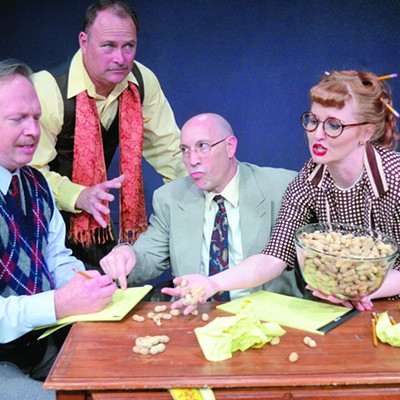WALTZING MATILDA. Usually, it's the music that guides the body's dance steps. But in the case of the waltz, it's the dance itself that informs the symphonic repertoire.
The Tucson Symphony Orchestra offers a concert that spotlights this dancerly music. Under the direction of Music Director and Conductor George Hanson, the TSO sachets in with Jean Sibelius' Valse Triste--literally, "sad waltz"--which depicts a dying woman dreaming of a dance. Following that is Symphony No. 5, which goes on an epic journey of discovery and renewal during which elements of the dance are interwoven into the fabric of the movements.
The second half of the program opens with a premiere of The Swing of Things written specifically for the Classic Seven concerts by TSO's composer in residence, Dan Coleman. It evolves from one idea into a series of variations--some say it's reminiscent of the ethereal work of waltz-maestro, Johann Strauss Jr. The concert also includes a suite from Richard Strauss' opera, Der Rosenkavalier, and closes the program with On the Beautiful Blue Danube.
Three shows take place this week on Thursday and Friday, March 13-14, at 8 p.m. and again on Sunday, March 16, at 2 p.m. at the Tucson Convention Center, 260 S. Church Ave. Tickets cost $13 to $38. Call the box office at 882-8585 to reserve yours or for more information.
WHEN IN TUCSON. "It's the highlight of our visitor season," says Bill Wellman, the Organ Pipe Cactus National Monument's superintendent.
O'odham Day celebrates its 13th year with a mess of activities on Saturday, March 15, from 10 a.m. to 4 p.m. Visit exhibits and demonstrations on traditional dryland farming, native plant use, basketry, pottery, storytelling and the O'odham language. Scale the bleachers to watch the Toká games and native dancers. The kids can play traditional games and learn the uses of mano and metates. Food booths offer Indian tacos, tepary beans and squash. Go back a few years with archaeologist Adrianne Rankin as she talks about the desert people who lived in the Organ Pipe Cactus area for the last 12,000 years.
The day's activities are free and the campground is located 35 miles south of Ajo, off Highway 85. Park at the visitor center and take the free shuttle to the campground. For details and directions, call (520) 387-6849.
A MAGIC NUMBER. Three Latin American heroines have made more of an impact on our thinking and arts than they ever knew they'd accomplish.
A new play tells the inspiring stories of Mexican painter Frida Kahlo, Salvadoran peasant and activist Rufina Amaya, and Argentine poet Alfonsina Storni. Their lives tumble together in Tres Vidas as actress Georgina Corbo and the Core Ensemble, a chamber music group, weaves their stories.
Kahlo's life, marked by physical suffering, has splashed across the silver screen recently. Her paintings, especially her self-portraits, lend an immediacy, frankness and strength that reflect not only on the artist's difficult life, but on her country's amidst its political struggles and poverty.
Amaya's story is less known. At 38, the housewife was the sole survivor of a heinous massacre in the early '80s--a time when the Salvadoran army swept through her town slaughtering nearly 1,000 peasants, including her husband and four children. And Storni was years ahead of her time advocating for women's rights--breaking through her husband's and father's control to write poetry, novels, journalism and plays.
Tres Vidas debuts on Saturday, March 15, at 7:30 p.m. for one show only at the Center for the Arts at Pima Community College, 2202 W. Anklam Road. Tickets cost $12 to $25. Get them at the box office at 206-6986.
CLINCHER. They're one of the last direct links to the origins of old time mountain and classic country music. They're Ralph Stanley II and the Clinch Mountain Boys. And they're crooning through Tucson this week.
Following in his father's and uncle's footsteps, Stanley carries on the family's bluegrass sound by staying true to his mountain roots. He started singing with his pop when he was 12 years old and even performed with the elder Stanleys at the Grand Ole Opry for Queen Elizabeth and at two presidential inaugurals. On the Grammy-nominated Stanley Blues, his third solo release, the younger Stanley demonstrates his mastery of the Clinch Mountain sound. You'll recognize strong elements of George Jones, Keith Whitley and his late uncle, Carter Stanley, fused together.
The "boys" consist of John Rigsby on mandolin, James Alan Shelton on lead guitar, James Price on fiddle, Steve Sparkman on the Stanleytone banjo and bassist Jack Cook, a 35-year veteran of the band. The show starts on Sunday, March 16, at 7 p.m. at the Berger Performing Arts Center, 1200 W. Speedway Blvd. Tickets cost $15 in advance at Antigone Books, Brew & Vine, CD City, Instrumental Music or online at www.dotucson.com. They'll cost you $18 at the door.
Questions? Call 297-9133.
SOME OF US ARE HUNGRY. The rent gets paid, the car gets fixed and the fridge is fully stocked. Aren't we lucky?
If you've ever dished out food at a soup kitchen, that's a start. But a single decision by a legislator can outweigh or multiply your individual contributions. Learn about local, national and international poverty and which U.S. legislation is actually addressing these issues. Maybe you'll glean a thing or two about how to influence your representatives' decisions.
Rise to the Challenge: End World Hunger takes place on Sunday, March 16, from 1:30 to 3:30 p.m. at St. Mark's Presbyterian Church, 3809 E. Third St. The workshop is a place for people of faith who want to make a difference in the lives of poor and hungry people. Start locally. Learn how to organize letter writing campaigns, ask questions of activists, connect to others fighting hunger, find out how your tax dollars are spent on domestic and international hunger programs and how to ensure the continued success and funding of these projects.
Speakers include folks from the Community Food Bank, the Association of Arizona Food Banks and a group called Results and World Concern. The workshop is hosted by Bread for the World, a non-partisan citizen's movement of 46,000 people of faith who lobby decision-makers to address hunger and poverty.
To find out more about the workshop, call Bread for the World at 1-800-315-3BFW.
TRIPPY AND FAR OUT, MAN. Reader's Oasis is the place to be for a swinging tribute to a pair of legendary '60s underground filmmakers.
This month's Film and Poetry Double Feature screens the groovy psychedelic hijinks of Kenneth Anger's short film, Invocation of My Demon Brother, a 12-minute romp through drugs, the occult and an appearance by real-life black magic guru Anton LaVey. Don't miss the groovy electronic soundtrack by Mick Jagger.
Following Anger's masterpiece is the campy freakout, A Reason to Live, by San Francisco filmmaker George Kuchar. Trash film-king John Waters claims Kuchar's '67 oeuvre was a major influence on his own demented storytelling style. The wacky flick is an acid-drenched send-up of the '50s melodramas (what better way to get through those), shot with heavy doses of sexual angst, creepy obsessive behavior and frenzied tornado watching.
The evening wraps up with live poetry read by Tucson's Albert Lannon, whose performances transform the energy of the cinema into spoken word.
Th screening takes place on Wednesday, March 19, at 8 p.m. The bookstore is located at 3400 E. Speedway Blvd. Questions? Call 319-7887.
Oh, and it's free.
SWORDS AND SNAKES. The Peking Opera slips through Tucson this week with fairy tales about stolen swords and snakes that make it to heaven.
Hailing from Jilin, the theatrical troupe has at its core two of the four Peking Opera stars known as the Four Small Celebrities. The humble pair, Ahilai Mao and Dezhu Song, take traditional theatrical forms in the Beijing Court of the Qing Dynasty--300 years ago--and fuse them with highly stylized speech, song, movement and costume--even martial arts.
The actors study for years to achieve the precision and dexterity required to perform. They aim for realism over beauty. Very little scenery is used. Plot is relatively unimportant. It's the song, dance and facial expressions that carry the story. Imagine how dropping a handkerchief, striding across the stage, brushing a sleeve or raising a finger in scorn gets the message across. The tales originate from old novels about heroes or lovers, military rebels and warlords, concubines, matchmakers and clowns--plus those gifted swords and snakes ascending to the heavens.
A single performance takes place on Wednesday, March 19, at 7:30 p.m. at UA's Centennial Hall, 1020 E. University Blvd. Tickets cost $12 to $34 with discounts for students. Call the box office for details at 621-3341.
BEAM ME UP ON THURSDAYS. The 92nd Street Y in New York attracts all kinds of speakers to its lecture series. Wish you could be there in person?
Now you can, sort of. From your cushy seat at Tucson's Jewish Community Center, "join" in the conversation via e-mail while listening to leading journalists, pollsters, priests, rabbis--even a former U.S. President--as they discuss and debate today's hottest topics. The interactive satellite spring series functions via a giant screen, state-of-the-art video technology and electronic hotline for you to query the speakers.
Here's the line-up: On Thursday, March 13, President Bill Clinton spills his version of the world today--as seen through the very special (and conveniently distanced) eyes of a former world leader.
On Thursday, March 20, a panel discussion gets underway. Biased or Balanced? Israel and the Media looks at how the Fourth Estate spins opinions. The panel includes Ethan Bronner of The New York Times; Stan Greenberg, pollster for the Clinton Administration and Barak campaigns; David Makovsky, of the Washington Institute for Near East Policy and formerly of Ha'Aretz. It's moderated by Gary Rosenblatt of The Jewish Week.
The final installment of the series ends on Thursday, April 3, with Jewish-Christian Relations in the New Millennium, a look at contentious and cooperative relations since the Holocaust. The panel includes Avery Cardinal Dulles, religion professor at Fordham University; Frank Griswold, presiding bishop of the Episcopal Church; Dr. Norman Lamm, president of Yeshiva University and moderator Dr. Eugene Korn of the Anti-Defamation League.
The screenings start at 8 p.m. Show up for one and it costs $6 for members or $9 for non-members. The whole series costs $15 for members or $24, non-members. JCC is located at 3800 E. River Road. Call them for details and reservations at 299-3000.







